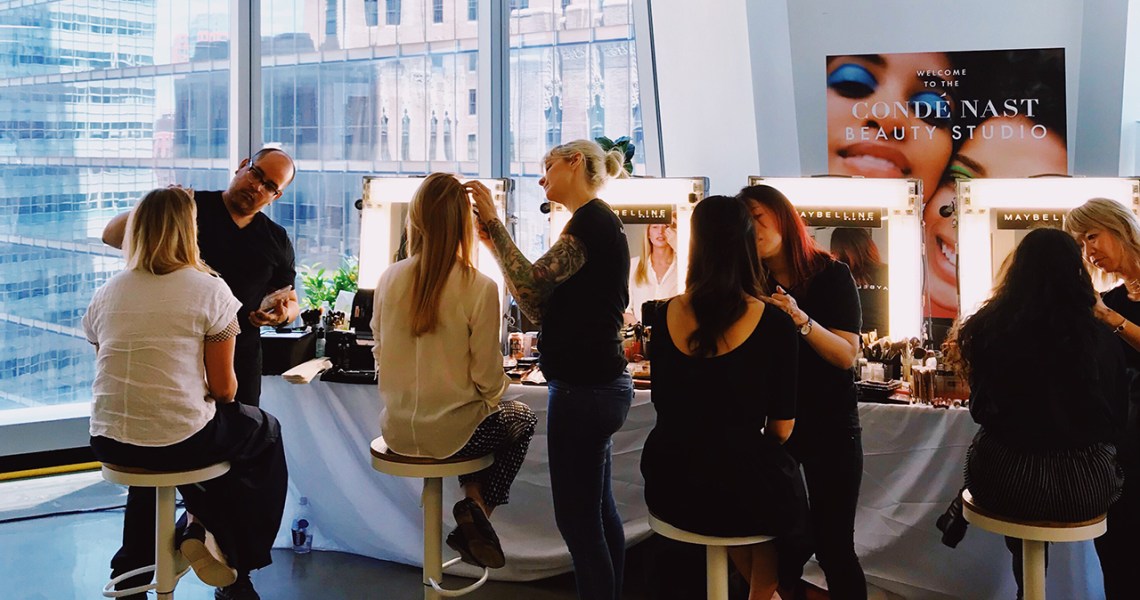Condé Nast has seen its bet on beauty pay off.
After launching its beauty content studio in September 2018, Condé Nast has seen the studio exceed revenue projections by 140%, according to the company. Lucy Kriz, Condé Nast head of beauty, declined to state the studio’s exact revenue for 2019 but said the studio had a seven-figure revenue goal. The space, which has held 160 editorial and advertising partner shoots or events in the last year, was meant to capture the attention of millennial and Gen-Z consumers for Condé Nast partners.
“What we saw as a challenge for advertising partners is the process between concept, development of content and delivery to the market,” said David Lopez, Condé Nast Entertainment vp of branded content. He said this is typically due to the number of third parties involved in a single project, from creative and influencer agencies to freelancers. “The ability to create content directly with our advertising partners allowed us to deliver something to the market within four to five weeks versus 10 to 12 weeks, which was typical,” he said.
The 2,600-square-foot studio initially launched with Neutrogena, Dyson and Urban Outfitters as advertising partners, and it has since brought in non-beauty and fashion partners such as The Home Depot, which outfitted the beauty studio with fixtures like sinks and a bathtub.
As more beauty brands, like Morphe, Ipsy and Avon, have opted to create their own in-house content studios to increase content cadence and speed of production, Condé Nast has found that it can be that close-knit resource for companies that do not have their own in-house capabilities and also want to reach a segment of Condé Nast’s 120 million readers across titles.
The beauty studio has produced content with brands including Glossier, Macy’s beauty department and Burt’s Bees. For Glossier, the studio created co-branded videos for Glossier’s Cloud Paint blush, including long-form Instagram Stories and other short-form videos for social. That content was distributed in an Allure branded article, on Allure’s social channels and on Glossier’s own channels. The studio’s partnership with Macy’s consisted of using editorial-identified trends in beauty to create a co-branded tutorial series with Allure, Glamour and Teen Vogue that ran on their social channels and featured Nars and Gucci fragrances.
“Beauty is a crowded market and more products launch every year. In order to stand out, [brands need] the magic of insight, great targeting and also a brand-building environment,” said Kriz.
Ad position: web_incontent_pos1
The initial success that the beauty studio has generated is a boon to the company, which has been struggling in a difficult media landscape. Condé Nast has been attempting to combine its U.S. and U.K. businesses together for most of 2019, and in April, the company installed Roger Lynch as new CEO to help propel the effort. (In 2018, Bob Sauerberg, the former CEO, estimated the company would return to profitability in 2020.) Beyond Condé Nast, its owner Advanced Publications Inc. is currently on a $10 billion dollar shopping spree to help diversify revenue streams.
As the company looks ahead to a path to profitability, more opportunities to utilize the beauty studio exist. Kriz said the studio will expand, although the company is determining if this means opening a second studio or expanding square-footage of the current one. Condé Nast is looking to expand its studio services beyond beauty by bringing in more fashion and wellness partners, and even those more focused on interior design and home.
“They all have different needs. We want to create versatility within the space so we can do everything from beauty and makeup tutorials to home,” Kriz said.




